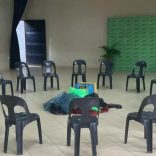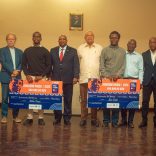Mozambique: Millennium bim signs cooperation agreement with Camões - Portuguese Cultural Centre to ...
Mozambique: The book no one would publish is now out – ‘The Last Days of Uria Simango’

"There is still much fear around talking about Uria Simango, and a lot of censorship. But I'm not afraid. I think I have social commitment. I am a Mozambican and very committed. I love Mozambique and I love its people. There is a need to lay matters to rest, because many people, including those involved in murders, are not well with themselves." Photo: O País
Adelino Timóteo has recently launched his book, “The Last Days of Uria Simango” in Beira.
Uria Simango, father of the current mayor of Beira, Daviz Simango, was one of the leaders of the Mozambican Liberation Front (Frelimo) in the struggle for national independence in the 1960s.
It is said that Simango was extra-judicially executed by Frelimo itself after independence in 1975, allegedly for treason. He was among those dubbed ‘reactionaries’ by the Maputo authorities, along with his wife Celina Simango and other Frelimo dissidents.
But author Adelino Timóteo’s research has uncovered a different Simango to that Frelimo has always presented.
“I discovered that Uria Simango is not that person who is said to have been ‘a seller-out of the motherland’, who handed himself over to the Portuguese to sell out national independence,” he says.
In the VOA interview below, Timóteo talks about a Simango considered “a very radical individual” by the Portuguese, “more radical than Eduardo Mondlane (…) a misunderstood figure, and in terms of nationalism, difficult to manipulate.”
Timóteo hopes the book will help Uria Simango to be understood as other than the usual ‘reactionary’.
Listen to Adelino Timóteo interview to Voa (in Portuguese) below:
Timóteo traverses the labyrinths of history with Uria Simango
The launch of the book at the Novo Cine was attended by family members, friends and residents of Beira. Reacting to the launch of the book, the Simango family quoted only an excerpt from a letter written by Urias Simango during the war of liberation.
“The once-and-for-all abolition of the nepotism, tribalism, regionalism, corruption and blackmail that certain elements use to achieve their ends.” (p.186)
This is Timóteo’s 15th book. After so much time browsing prose and poetry, the writer this time decided to follow a different path: the course of history, which is made of several stories, and so Timothy prepares to release his latest book, The Last Days of Uria Simango, issuing from his investigative work.
‘The Last Days of Uria Simango’ is a biographical essay in which the writer focuses on Uria Simango’s social and political trajectory from his earliest days of exile in Zimbabwe, his joining Udenamo and his involvement in the founding of Frelimo, without neglecting the disagreements in the liberation movement that culminated in his death.
According to the author, the research allowed him to reconstitute Uria Simango’s trajectory and, at the same time, to structure his entire profile. As a result of this procedure, Timothy debunks all the negative connotations surround Simango.
“I could see, through my research, that Uria was the victim of a cabal, a plot. Under normal conditions, a person with that nationalist profile would never deserve the death he endured,” said the writer, fresh from chilly Europe to launch the work in his native land.
A curious fact. Before Timóteo resolved to write a book about Uria Simango, he wanted to write about his father’s life. On one of the occasions when he was in Lisbon (Portugal), he searched the PIDE archives for something to indicate to what extent his father was involved in the armed struggle.
“They killed my father too. So when I found myself in Lisbon, I wanted to understand the reasons that led to my father’s death. In the PIDE archives, I found a photograph of my father, but in terms of information, I was confronted with a lot of material about Uria. So I compiled all the information I found.”
Abandoning the pretence of writing about his father, Timoteo began to trace, among other sources, the PIDE dispatches from that made almost daily reference to what happened within FRELIMO. The writers knew the various faces of Uria Simango: nationalist, diplomat, religious man and combatant.
“I capitalised on everything in the offices. Uria had many pseudonyms – Uria Simanta, Simangão, John Goddy, and was an interesting figure who found various ways to deceive the PIDE, who were policing him 24 hours a day.”
The idea of writing about his father, who was killed more than forty years ago, was to memorialise his story. “I am a writer, but I should not always write fiction. I also have to deal with my concerns. But I think the book may interest several Mozambicans, students and society in general. In fact, there is much in common between Uria Simango and my father. Both were killed for a political cause, but their deaths were never explained. They were summarily executed in an independent state,” Timóteo says.
Timóteo’s new book has 200 pages, and was written between 2012 and 2014 in Portugal.
This first edition is published by the author, because, Timóteo says everyone he approached to publish the book turned him down.
“There is still much fear around talking about Uria Simango, and a lot of censorship. But I’m not afraid. I think I have social commitment. I am a Mozambican and very committed. I love Mozambique and I love its people. There is a need to lay matters to rest, because many people, including those involved in murders, are not well with themselves.”
Timóteo hopes the work will give readers a sense of the feelings, of which he himself is acutely aware, arising from the injustice perpetrated by one man on another, because no human being has the right to take the life of another. “As Gabriel Garcia Marquez says, one man should not look at another to bring him down him, but to help him.”
For the author, this was a difficult piece of writing, since he had to read several books on Uria, including from the CIA and Interpol, in order to cross-check information and illuminate some shadowy areas. “In fiction there is more freedom. Here I was not at liberty to say what I wanted; everything was conditioned by the documentary information. I’ve been in the newspaper archives a lot since the 60s. It was a very thorough job. It could have been easier if the oral sources had cooperated, but they have not opened their doors to me because they are afraid of being compromised.”












Leave a Reply
Be the First to Comment!
You must be logged in to post a comment.
You must be logged in to post a comment.